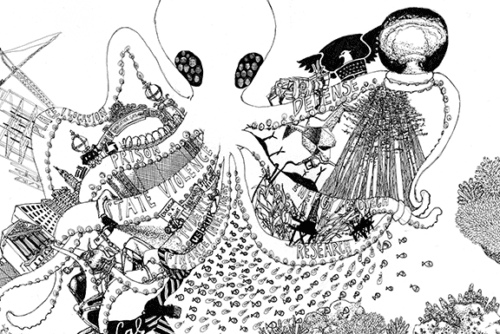Law’s Imagination
I mean, honestly, this is a criminal law issue, women who are battered are protected by the criminal law system, people who are being trafficked are being protected by the criminal law system. How do you propose to stop or ameliorate it if you stop working with law enforcement agencies? Is there a way, can you think of any way? I can’t.
R.W. had just finished a long string of stories about her work as a nonprofit attorney serving primarily Asian immigrant women in communities across San Francisco—communities that she herself grew up in. As we discussed the U visa she shared her thoughts about both private practice and nonprofit legal work. Her question, “is there a way, can you think of any way?” is reminiscent of K.S.’s remarks presented at the opening of this paper. But R.W.’s words also revealed a sense of apprehension about what would happen if immigrant women were seen as anything other than legal subjects cooperating with law enforcement as crime victims. In my reading, her implicit meaning was that women who are battered are at the very least protected by the criminal legal system and this protection, while insufficient in many ways, was the only path imaginable in our current moment. And it is this limit of imagination that we must recognize as being reinforced by the U visa.
In my conversations with legal advocates there were many variations of how the usefulness and the benefits of the visa were valued and critiqued. I believe such variations, such differences in approach, will continue for some time but it is imperative that we consider how they are anchored by a set of legal practices and legal discourses set in motion by the visa itself. This specific political spectrum—a tunnel marked at the entrance as no other way and reaffirmed at the exit as only one way—certainly elicited frustration on the part of legal advocates. “I mean honestly,” R.W. asked, “Is there a way, can you think of a way? I can’t.”
The apprehension R.W. expressed—“how do you propose to stop or ameliorate [violence], if you stop working with law enforcement agencies?”—runs through the life of the visa and grounds the anxiety provoked by imagining the loss of visibility for women beyond this view, but it also requires the continual disavowal of the criminalization of their lack of legal status. By narrating cooperation as freely given while at the same requiring it, the U visa forgets the conditions of violence caused by the criminalization of the lack of legal status. It disavows the fact that it is only by rendering undocumented immigrant women culpable in the first place that the law forces them to need visas, to fall beholden to them, and into an impossible status where they must become part of enforcement in order to be protected and ultimately, to avoid their own punishment as well as the broader structures of punishment institutionalized against immigrant communities.
Beyond attempts to classify the U visa as a “good” or “bad” law, what I see reflected in R.W.’s question, “how do you propose to stop or ameliorate it [violence] if you stop working with law enforcement agencies?” is the power of the visa to affect the death of political imagination. R.W. insightfully reflects on the fiction of nonconvergence, in which the state has placed high stakes on holding innocence of the “good” immigrant and culpability of the “bad” immigrant apart in the U visa scheme. It is this fiction which should be the analytical genesis for a radical critique of legal protection and punishment, when the law is only invested in immigrant woman as partners in cooperation with police but not in fostering social, economic, and housing conditions that would allow immigrants to form partnerships within their own communities—all things that are actually fundamental to any and all kinds of transformative antiviolence effort and harm reduction practices. 1 The mechanics of the U visa reveal that its primary focus is the betterment of law enforcement. The needs of survivors are an afterthought, and the disavowal of culpability is put in the place of the purity of innocence and complete disregard for the experience of immigrant communities.
Eve Tuck and Wayne Yang have written that opportunities for solidarity are found in what is incommensurable rather than what is common. 2 This ethic is a move toward relinquishing settler futurity, abandoning the hope that settlers can be commensurable with indigenous peoples, and looking instead at moments where communities have been led to divest of themselves and of each other. We can do the same with the U visa—resist cooperation and the marking of immigrant women’s survival as a “common ground” between communities and police and push away the law’s attempts to enlist immigrant women into servicing police rather than serving their own selves and communities; we can do this so that immigrant women’s lives do not become beholden to the history of anti-black violence and universalisms of innocence. We should look at how the legal fiction of “cooperation” makes an immigrant-rights political agenda incommensurable with an abolitionist, anti-policing, and decolonial politic. It is the distance between that sets the logic of incommensurablity as a site from which we ought to excavate the violence of new political practices, solutions and claims that were not previously there. The U visa ensures that once immigrant women obtain visas, they have no future outside logics of punishment, and, further, that they become part of a legal formation that carries out the long history of racial violence of modern punishment in law.
Conclusion
Nadine Naber’s discussion of anti-imperialist transnational feminist approaches outlines a particular space for reinterpreting theorizations of alliance and accountability among women of color, transnational, and native feminist movements. 3 Taking care to push back against liberal misreadings of this call as a move toward equating experiences, Naber instead argues that if the state has displaced women through movements of war, how might we ask new kinds of questions that allow us to theorize and develop political practices of alliance and accountability to the movement of people and places that do not commence? To borrow from Tuck and Yang, we might also consider the high stakes of finding strategies that do so as a way to create long-term resistance against the state’s strong investment in establishing desires for incommensurability among political formations.
The U visa has serious implications for the future of scholarship on immigration law, criminal enforcement, and violence against immigrant women. A growing body of literature in Asian American Studies urges us to open up critiques against frameworks that have been even less willing to perceive of immigration itself as a form of state violence unless in moments of exceptional violence or forced migration. Under such frames, immigration protections like the U Visa have largely escaped the same critical attention given to other forms of criminal enforcement and the broader area of immigration laws.
At the beginning of this discussion, I presented a conversation between K.S. and me and sought to highlight the urgent need for careful analysis and serious consideration of the frustrations that K.S. explained. In doing so, I hope that this discussion provided new ways for us to think about the U visa, immigration law, antiviolence, and criminalization. I have been thinking about this visa for some time now. Early on, I struggled to find language that would allow me to write about the deeper complexities of the visa without losing site of the serious stakes for immigrant women when they need legal status and the conditions their advocates labor under when no other legal tools are available for their clients. My hope is that this discussion provides some new language that challenges the terms of legal protection and the legal fiction of cooperation—language we can use to collectively strategize within our own communities and across others and to resist the very deep-rooted violence we face when the law brokers innocence and culpability.
- For discussion on alternatives and community based violence interventions see: “Creative Interventions Toolkit: A Practical Guide to Stop Interpersonal Violence” available at http://www.creative-interventions.org/tools/publications/.[↑]
- Tuck, Eve and K. Wayne Yang, “Decolonization Is Not a Metaphor,” Decolonization: Indigeneity, Education, and Society 1 (1) (2012): 1-40.[↑]
- Nadine Naber, “Transnational Anti-Imperialism and Middle East Women’s Studies,” Jadaliyaa 2 July 2013.[↑]


